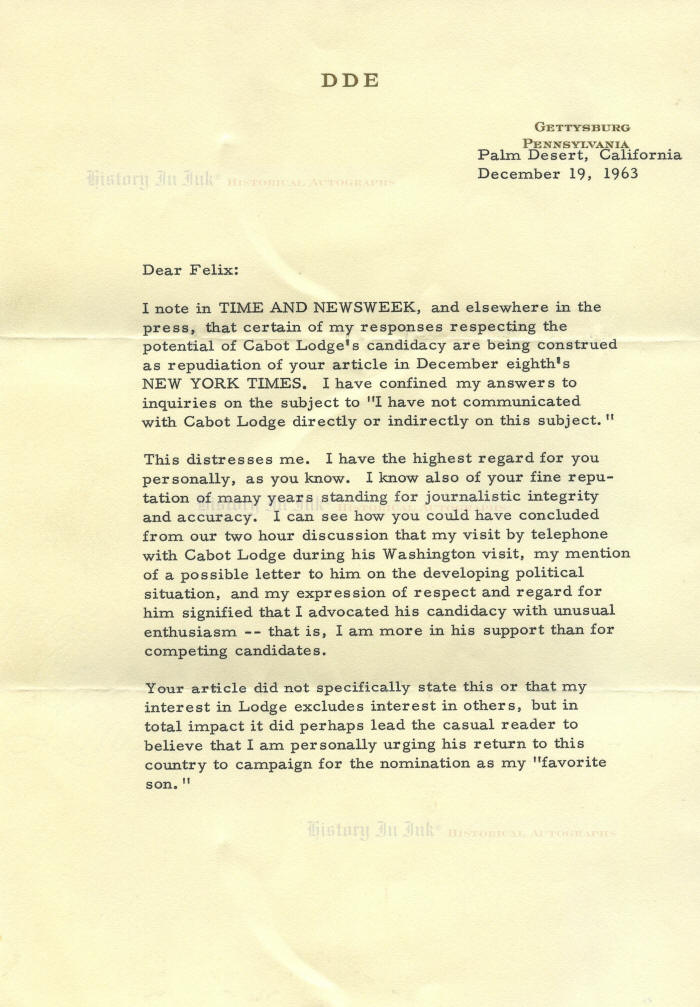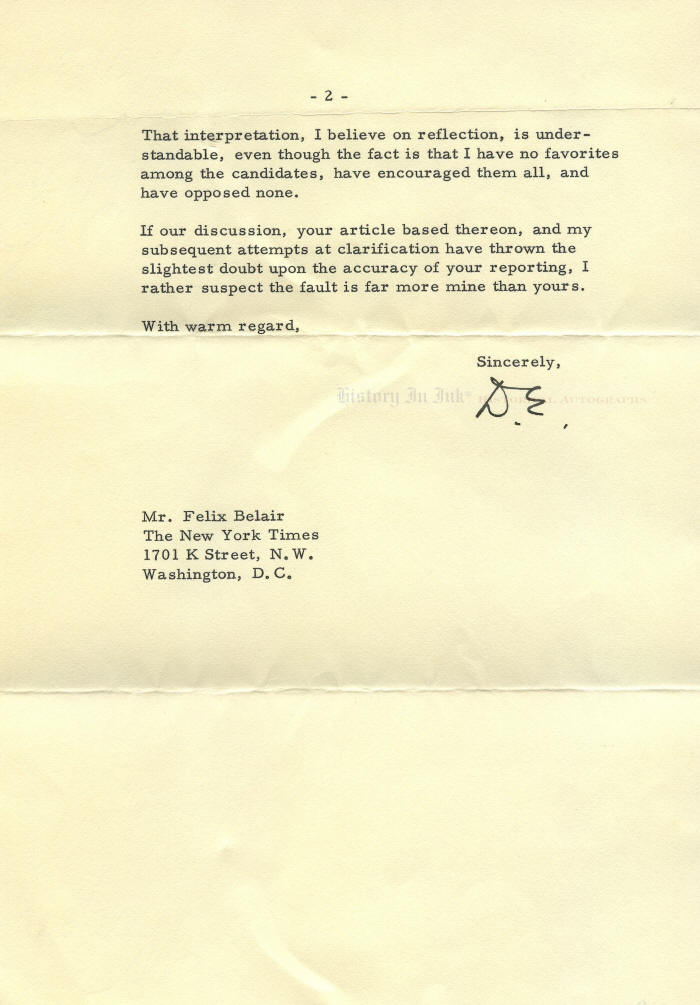
1327604
Dwight D. Eisenhower
Scroll down to see images of the item below the description
”I rather suspect the fault is far more mine than yours.”
Dwight David Eisenhower, 1890-1969. General of the Army; Supreme Commander, Allied Expeditionary Force, World War II; 34th President of the United States, 1953-1961. Typed Letter Signed, D.E., two pages, 7" x 10½", on personal stationery, Palm Desert, California, December 19, 1963.
This is an excellent political content letter in which former President Eisenhower denies that he favors anyone in particular for the 1964 Republican presidential nomination. Writing to Felix Belair, Jr., the longtime White House correspondent for The New York Times, Eisenhower tries to save face with what amounts to only a backhanded apology: Although he compliments Belair and tries to explain his backtracking on his admitted suggestion that he supported Henry Cabot Lodge, Jr., then the United States Ambassador to South Vietnam, over other candidates, he just cannot accept all of the blame. He writes, in full:
I note in TIME AND NEWSWEEK, and elsewhere in the press, that certain of my responses respecting the potential of Cabot Lodge's candidacy are being construed as a repudiation of your article in December eighth's NEW YORK TIMES. I have confined my answers to inquiries on the subject to “I have not communicated with Cabot Lodge directly or indirectly on this subject.”
This distresses me. I have the highest regard for you personally, as you know. I also know of your fine reputation of many years standing for journalistic integrity and accuracy. I can see how you could have concluded from our two hour discussion that my visit by telephone with Cabot Lodge during his Washington visit, my mention of a possible letter to him on the developing political situation, and my expression of respect and regard for him signified that I advocated his candidacy with unusual enthusiasm—that is, I am more in his support than for competing candidates.
Your article did not specifically state this or that my interest in Lodge excludes interest in others, but in total impact it did perhaps lead the casual reader to believe that I am personally urging his return to this country to campaign for the nomination as my "favorite son.”
That interpretation, I believe on reflection, is understandable, even though the fact is that I have no favorites among the candidates, have encouraged them all, and have opposed none.
If our discussion, your article based thereon, and my subsequent attempts at clarification have thrown the slightest doubt upon the accuracy of your reporting, I rather suspect the fault is far more mine than yours.
Lodge served as United States Senator from Massachusetts until John F. Kennedy defeated him in 1952. The Massachusetts race was close, but Lodge neglected his own campaign to help Eisenhower. Eisenhower repaid him by appointing him United States Ambassador to the United Nations. Lodge subsequently ran as the Republican vice presidential candidate with Richard Nixon in 1960. Kennedy, who respected Lodge, appointed him Ambassador to South Vietnam in 1963.
Several candidates, including Arizona Senator Barry Goldwater, New York Governor Nelson Rockefeller, and Pennsylvania Governor William Scranton, lined up to challenge President Lyndon B. Johnson in 1964. Lodge, however, was the surprise winner of the New Hampshire primary after a group of political amateurs, whose efforts he did nothing to support, waged a write-in campaign on his behalf. After the New Hampshire victory, Lodge looked more seriously at running. He won two more primaries, in Massachusetts and New Jersey, but Goldwater ultimately got the nomination.
One wonders whether Eisenhower thought that he had been caught with his hand in the cookie jar. Yet by hedging on his seeming apology for misleading Belair, he nevertheless lays blame at Belair's feet as well as his own: By saying that “the fault is far more mine than yours,” Eisenhower clearly refuses to accept full responsibility for his own statements.
Belair (1908-1978), had covered Eisenhower in the White House, and Eisenhower liked him. At the time of his death, Belair had served in the Times' Washington bureau longer than any reporter in its history.
Eisenhower has signed this letter in black fountain pen with only his initials, the form of his signature that he used for close acquaintances. The letter has folds and shows a bit of handling, but overall it is in fine condition.
Unframed.
_____________
This item has been sold, but
click here to see other
Presidents and First Ladies items
that we are offering.




